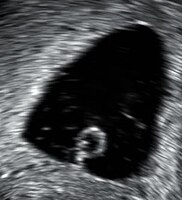
Photo from wikipedia
Mifepristone has been used for first-trimester abortion and contraception. Nevertheless, its functional mechanism still needs to be elucidated. Decidua tissues were collected from 40 pregnant women who received (20 patients)… Click to show full abstract
Mifepristone has been used for first-trimester abortion and contraception. Nevertheless, its functional mechanism still needs to be elucidated. Decidua tissues were collected from 40 pregnant women who received (20 patients) or did not receive (20 patients) mifepristone. Immunofluorescence was used to analyze the effect of mifepristone on the quantity of CD56 and CD206 in decidua. in vitro assay, NK cells were isolated from decidua tissue and macrophages were induced from THP-1 cells. NK cells were co-cultured with macrophages pre-treated different concentrations of mifepristone (0 nmol/L, 200 nmol/L, 1800 nmol/L, and 25000 nmol/L); the cells' cytotoxicity and migration ability were analyzed using MTT assay and transwell assay, respectively. Si-TGF-β1, which was utilized to knock down the TGF-β1 expression in macrophages and human recombinant TGF-β1 were used to verify whether TGF-β1 was involved in the mifepristone regulation of NK cells function. The quantity of CD56 and CD206 decreased after mifepristone treatment. Moreover, the NK cells' cytotoxicity and migration ability were significantly increased by macrophages pre-treated with mifepristone in a dose-dependent manner. Moreover, compared with the si-NC group, the MTT absorbance rate of NK cells was significantly increased in the si-TGF-β1 group and was decreased in the human recombinant TGF-β1 group. Our data suggest that mifepristone, which regulates NK cells function through macrophages, was associated with the changes in TGF-β1 secreted by macrophages. This may be one of the mechanisms of mifepristone acting as contraceptive and abortion drugs at the maternal-fetal interface.
Journal Title: Reproductive biology
Year Published: 2021
Link to full text (if available)
Share on Social Media: Sign Up to like & get
recommendations!